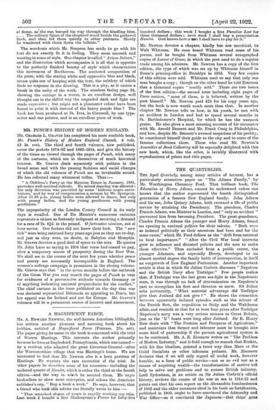A MAGNIFICENT FARCE.
Mu. A. EDWARD NEWTON, the well-known American bibliophile, has written another pleasant and amusing book about his hobbies, entitled A Magnificent Farce (Putnam. 25s. net). The paper giving its name to the book is concerned with the trial of Warren Hastings. This interests the author primarily because he lives at Daylesford, Pennsylvania, which was named— by a resident who admired the great Governor-General--after the Worcestershire village that was Hastings's home. We are interested to find that Mr. Newt= also is a keen partisan of Hastings. He reprints the rare mezzotint of the trial. In ether papers he describes some of his treasures—including the undated quarto of Hamlet, which is either the third or the fourth edition—and the way in which he secured them. He urges booksellers to show more enterprise, and echoes the American oublieher's cry, " Buy a book a week." He says, however, that t friend who took this advice too literally wrote to him --
" That wretched slogan of yours is rapidly working my min. Last week I bought a first Shakespeare's Poems for forty-five
hundred dollars ; this week I- bought a first Paradise Lost for three thousand dollars ; next week I shall buy a presentation- Hanalei. God knows how as neh I shall have to pay for it."
Mr. Newton devotes a chapter, kindly but not uncritical, to Walt Whitman. He once heard Whitman read some of his poems, and he bought from Whitman several autographed copies of Leaves of Grass, in whieh the poet used to do a regular trade among his admirers. Mr. Newton has a copy of the first edition, the type of which was set up by Whitman himself in Rome's printing-office in Brooklyn in 1855. Very few copies of this edition were sold. Whitman used to say that only one man bought a copy ; though on the other hand he told Emerson that a thousand• copies " readily sold." There are two issues of the first edition—the- second issue including eight pages of Press notices, " most of them, it is believed, written by the poet himself." Mr. Newton paid £25 for his copy years ago, but the book is now worth much more than that. In another chapter Mr. Newton tells us how, in his youth, he met with an accident in London and had to spend several months in St. Bartholomew's Hospital, for which he has the warmest praise. He also gives a most amusing account of his encounter with Mr. Arnold Bennett and Mr. Frank Craig in Philadelphia, and how, despite Mr. Bennett's avowed suspicions of his probity, he constituted himself their guide to the city and to some of the famous collections there. Those who read Mr. Newton's Amenities of Book Collecting will be especially delighted with this new book, which, like the other, is lavishly illustrated with reproductions of prints and title-pages.


































 Previous page
Previous page